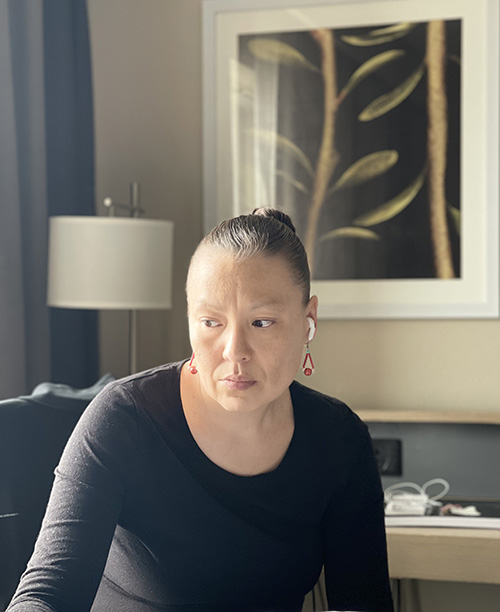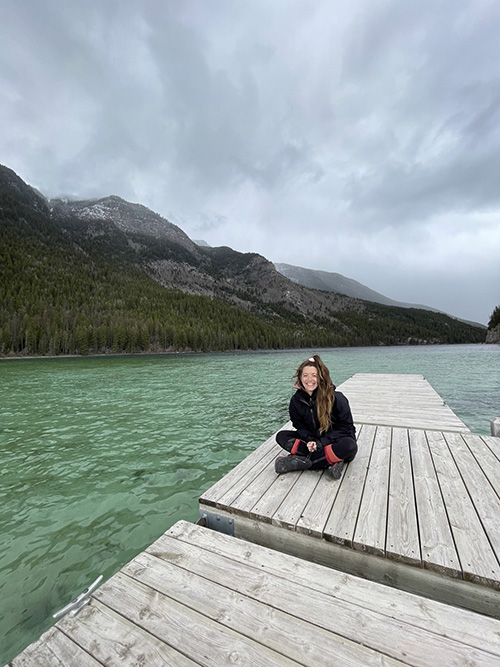UM’s Popular Online Master of Social Work Meets Students Where They Live
MISSOULA – Like a lot of parents facing an impending empty nest, Fort Belknap resident Nona Main found herself last year asking what’s next?
With a background in public health and health education, the mother of a soon-to-be-graduating high schooler already had rich professional experience, but she wanted to do even more to improve the lives of those living in her Native community.
The rub was she wanted to do this while staying in her community.

Fort Belknap resident Nona Main wants to use her Master of Social Work degree to improve her community through policy changes and helping Native children.
“I wanted something online that I could take while also working,” said Main, a member of the Aaniiih and Nakoda tribes of the Fort Belknap Indian community. “I saw on Instagram that the University of Montana was offering a new online option for their master’s degree in social work, and I decided to apply.
“The application was seamless and staff was very helpful,” she added.
One of UM’s fastest growing programs, UM’s online Master of Social Work posted a 200% increase in enrollment over the past year. Amanda Cahill, a clinical assistant professor in the School of Social Work, said the program’s robust history of quality programming and affordability has contributed to the popularity of the school, which earned a top 100 rating for best schools for social work by U.S. News & World Report in 2022.
UM launched the online MSW option in fall 2021, Cahill said, to address the need for more accessible education, particularly in rural and Indigenous communities. Its current class includes students from 23 states – as far away as Vermont and North Carolina – and two provinces of Canada.
“A core value of social work is meeting people where they are in their lives,” Cahill said.
For student Hannah Perno that happens to be the Flathead Valley, where she moved seven years ago from upstate New York with an undergraduate degree in environmental policy and urban planning. After a stint working for the forest service as a fire fighter and being a bit of a “ski bum,” she considered moving to Missoula to get a graduate degree.

With UM’s online Master of Social Work program, Flathead Valley resident Hannah Perno can pursue her studies while remaining in the community she one day wants to help.
“With the online option I have been able to remain part of the community that I love and am active in, which is a huge source of purpose and connection for me while pursuing this graduate degree,” Perno said.
Assistant Professor Ashley Trautman, chair of the School of Social Work, said social workers are uniquely positioned to respond to some of society’s most pressing social justice issues, citing homelessness, high rates of suicide, mental health challenges and continued assaults on tribal sovereignty.
“Social workers are trained to accompany individuals, families and communities in crafting meaningful interventions that honor their dignity and worth,” Trautman said. “By helping students stay in their home communities while completing their education, the MSW online program reduces barriers to accessing graduate education, and in doing so, our program is increasing the number of trained social workers ready to address social justice issues across our state and country.”
The program’s focus on social justice resonated deeply with Main, whose professional experience included two years working for UM’s National Native Children’s Trauma Center and nine years in health education with youth and underserved children in the Fort Belknap and Crow communities. She earned her undergraduate degree in liberal studies and Native American studies from Montana State University-Billings.
“I like the structure of the UM’s social work program and its anti-racist approach. This program addresses that head on,” said Main, who currently is working as a senior research program coordinator through a Johns Hopkins’ program studying suicide on reservations. “I have felt as a student in the program that I can authentically speak without fear. It’s felt like a safe space.”
Both Main and Perno are still exploring the many career avenues that someone with a master’s in social work can take, including research and public policy.
Main said she is passionate about improving her community through policy changes and improving life for Native children.
Perno, having been a firefighter, is interested in being a therapist for first responders, but she also has seen what the housing crisis has done in her community, so applying her new skills in policy and programs may be in her future. This summer she is working at The Abbie Shelter, a Flathead Valley provider of services for women escaping domestic violence, and will complete her practicum at the shelter this fall.
The practicum is a core component of the three-year MSW program, requiring students to engage in direct service work in their communities for a total of 900 hours throughout their course of studies. Perno said it may lead her into working in issues related to domestic violence.
“I am leaving my options open,” Perno said. “But I look forward to using my new skills to making a difference in areas that matter in my community.”
###
Contact: Dave Kuntz, UM strategic communications director, 406-243-5659, dave.kuntz@umontana.edu.